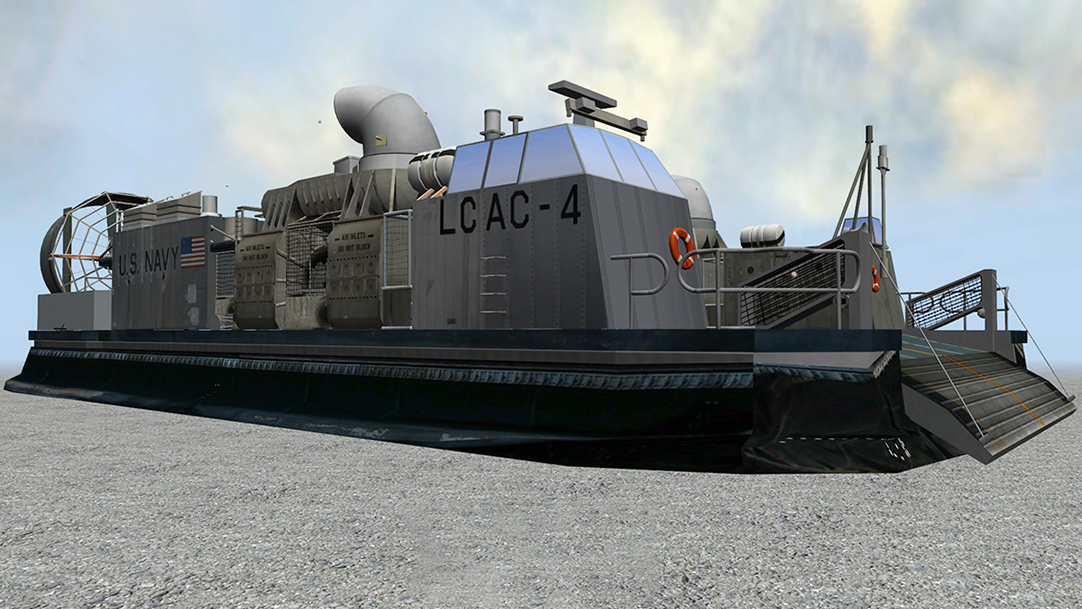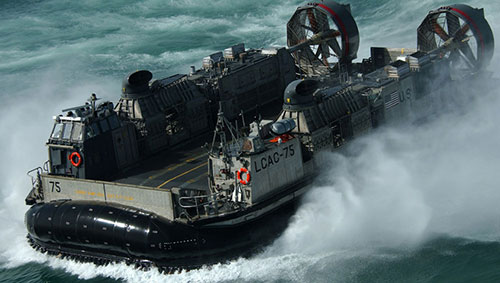
The U.S. Navy’s Landing Craft Air Cushioned Vehicle (LCAC)
High-Speed, Fully Landing Amphibious Craft
The U.S. Navy’s Landing Craft Air Cushioned Vehicle (LCAC) is a high-speed, fully landing amphibious craft, performing assaults and operational maneuvers from ship to shore as well as across the beach. Because the U.S. Navy LCAC is a crucial vehicle to U.S. Navy missions, training devices built to support the LCAC’s operations must match the quality of the craft itself, along with refurbishments required to keep the fleet operational into the next decade.
To ensure that training material for the LCAC remained relevant, the U.S. Navy contracted UNITECH, now Lockheed Martin, to transition the outdated Legacy training program into a more encompassing training program. As a way to reduce cost and risk, UNITECH teamed with DiSTI to provide the virtual interactive training portions for this endeavor.

Beginning in 2002, the U.S. Navy began to execute their plan to update their training program by supplanting the LCAC’s operator trainer through Desk-Top Trainers (DTT). The Navy selected UNITECH to develop the highly advanced supplemental training aids. UNITECH turned to DiSTI to provide a combination of special program management, expert software engineering services, and innovative technology to the program’s success. DiSTI provided the necessary tools and services to create the virtual command module of the LCAC for the DTT operator trainer. Approximately two years later, the U.S. Navy instituted a Service Life Extension Program (SLEP) requiring a comprehensive trainer to simulate upgraded LCAC operations. At this stage of development, the operator trainers were able to utilize 50% of the original command module content from the DTT, which created significant cost savings for the program.
In the following year of 2005, the SLEP required Maintenance Training specific courseware for the LCAC, with the ability to reuse 90% of the previous command. During this time, the full Maintenance Trainer and operator trainers were updated with newer, high-fidelity graphics, including glass displays. With the completion of the training program’s transition in 2008, about 90% of the maintenance trainer courseware was able to be recycled with with modern applications and state-of-the-art graphics.
To retain consistency and control costs, most of the original virtual operator stations were reused in phase of the update transition. In order to accomplish this, software developers at DiSTI created hundreds of reusable software objects (RSOs) to realistically replicate the detailed functions and behaviors of each component within the LCAC.
DiSTI developed the high fidelity, photo realistic courseware content that was effectively blended into the existing courses, which fully heightens the learning experience. This courseware consists of instructor-led, alternative technology-based instruction and laboratory exercises, with all courses are web enabled, providing performance-based assessments for each student. By engaging the student, this training program offers the ability to track student progress, resulting in continued motivation to learn by the student.
The updated LCAC training program received unprecedented training realism, significant cost savings with the reusability and portability of simulations, and reduced future training costs through the RSOs recyclable nature.
Inquire about our professional solutions today.
Start your developer journey with our solutions now.
We will use your information to respond to your inquiry. We may also contact you about our products and services. You may opt-out at any time using the unsubscribe link in messages you receive from us. You can learn more about how we handle your personal data and your rights by reviewing our privacy policy.